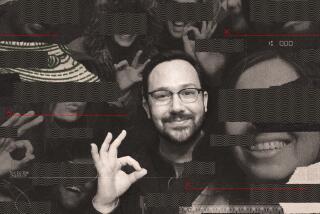Thank Mrs. Nabokov for ‘Lolita’
NEW YORK — Thanks to the current lawsuit against the publisher of Dan Brown’s “The Da Vinci Code,” Blythe Brown has entered a pantheon whose occupants include Vera Nabokov, Olivia Twain and Tabitha King.
The indispensable literary spouse.
For the record:
12:00 a.m. April 9, 2006 For The Record
Los Angeles Times Sunday April 09, 2006 Home Edition Main News Part A Page 2 National Desk 1 inches; 36 words Type of Material: Correction
Mark Twain: A story in Monday’s Calendar section about women who collaborated with their writer husbands said Mark Twain read his manuscripts aloud to his wife, Olivia Twain. She should have been identified as Olivia Clemens.
Michael Baigent and Richard Leigh are suing Random House Inc., alleging that Dan Brown “appropriated the architecture” of their 1982 nonfiction book, “The Holy Blood and the Holy Grail.” Arguments in London’s High Court recently ended and a judgment is expected in the next two weeks or so.
Few had heard of Blythe Brown before the trial, but as the author’s witness statement and court testimony revealed, she was an essential contributor to his historical thriller. She led the massive research effort, supplied countless notes and suggestions and offered an invaluable “female perspective” for a book immersed in “the sacred feminine, goddess worship and the feminine aspect of spiritually.”
Her unexpected prominence made for fine courtroom drama, especially since Blythe Brown did not attend the trial, but she is actually one of many spouses who have served well beyond the traditional roles of muse or moral support. They have been researchers, editors, agents and virtual co-authors. They are not half of a famous literary couple, like Joan Didion and John Gregory Dunne, but private collaborators usually little known beyond friends and family.
“She [Blythe Brown] dislikes the public attention and I [see] no reason why she should be put through the stress that the glare of publicity would cause,” Dan Brown said in a statement explaining his wife’s absence.
Vera Nabokov, for example, was Vladimir Nabokov’s translator, first reader, occasional researcher and, in one famous case, his literary savior. Vladimir Nabokov was so frustrated with one novel in progress that he attempted to burn it in a backyard incinerator. Vera intervened, and her husband went on to complete “Lolita.”
Several leading historians have openly acknowledged the role of their wives, including David McCullough, who has called Rosalee McCullough his “Editor in Chief,” and the late Daniel Boorstin, who relied upon Ruth Boorstin to review all of his manuscripts.
Mark Twain read his manuscripts aloud to Olivia Twain, and she helped him proofread his breakthrough book, “The Innocents Abroad.” Stephen King has often cited his wife, Tabitha, noting that she rescued the manuscript of “Carrie” from the trash and contributed essential, firsthand research on a world about which he knew little: the girls’ locker room.
The list of indispensable male spouses appears far shorter. Writers interviewed for this story struggled to name famous female writers with husbands who quietly, and substantially, assisted in their work. Reasons cited include a lack of spare time, with the husband usually having a full-time job, and the reluctance of men to sacrifice their own ambitions.
More to Read
Sign up for our Book Club newsletter
Get the latest news, events and more from the Los Angeles Times Book Club, and help us get L.A. reading and talking.
You may occasionally receive promotional content from the Los Angeles Times.






